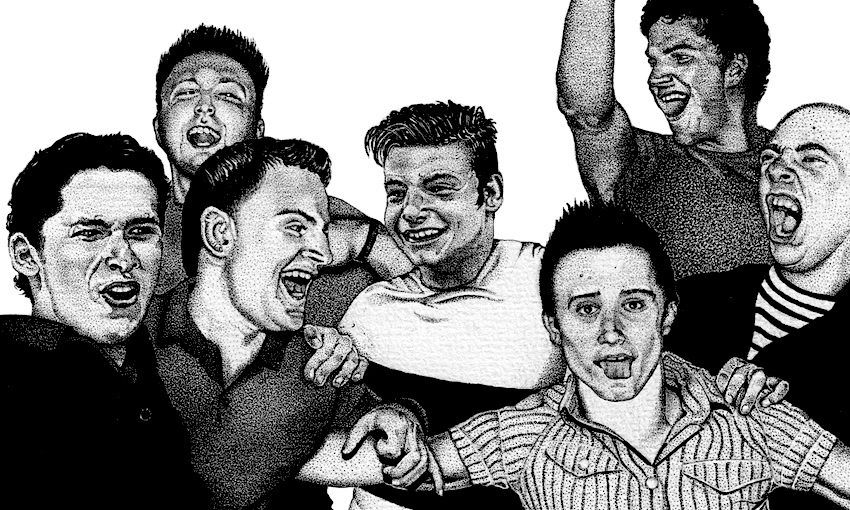Author Brannavan Gnanalingam on the surprising response to his 2020 novel, Sprigs.
Sprigs is a book about the way institutions circle the wagons when responding to accusations of sexual violence. In the book, a 15-year-old is raped by members of a private school’s First XV at the end of season afterparty. I write about how PR (or “public relations”, for anyone blessed to not be saturated in that world) and self-preservation become a more urgent priority than justice or thinking about victims. But the book is also about how the cover-up of a crime can become an even bigger crime.
Sprigs wasn’t based on any specific incident, but there’s a long catalogue of shocking incidents where the same narrative played out over and over again. I wanted to write about how a structural response could play out – hence I wrote about the incident in the book from over a hundred characters’ perspectives, as a way of demonstrating how that structure is created.
I simply assumed I’d written a black comedy that’d go the way of my other books: read by a few folks, and then forgotten. I mean I’m a New Zealand writer published by a pissant (TVNZ’s legal team’s word for us – long story) publishing collective, after all.
I hadn’t expected the response the book would receive. Guys I never talked to about books said they’d read it and it captured high school for them. Other guys said they couldn’t finish the final section of the book, the section where it all comes together. I heard ex-private school principals were arguing about it in the Wellington Club. I had to sign copies for current boys’ school principals.
I’d also heard that high school students who had organised protests in response to incidents at neighbouring schools had also read it. Some of these students also started petitions to overhaul sex education (and teach consent), and carried out wider surveys to highlight their experiences. If true, to have played a tiny part in those students’ mobilisation, is genuinely the best thing that’s ever come out of my writing. I’m of the view that political art is a poor substitute for actual social movements, so am chuffed that Sprigs has had some impact.
The rapists in the book are members of the First XV at a fictional school, St Luke’s. The first section of the book is a detailed depiction of a high school rugby final between a couple of made-up Wellington schools. The scene is a MacGuffin – a mechanism to introduce many of the book’s key characters in a single setting. Despite that, it’s understandable that the book was read as being a critique about rugby culture and the boys/men that come out of it. “Sprigs” in the title refers not only to the part of the rugby boot you use to stand up in the mud, but also the “shoot” of a plant, something that’s about to grow into something more fully formed.
The thing is, I like rugby. I was mates with the so-called jocks in school. I was never allowed to play rugby, though. Mum’s cousin died playing rugby back in Sri Lanka. My uncle simply disappeared from grief in the aftermath. With that background, fair enough. But I still played at lunchtime with mates. When I was 8, I copped an accidental elbow to the stomach while being tackled. My appendix had to be urgently removed just over 12 hours later.
I used to watch a lot of rugby, and my opinions would surprise people who wouldn’t expect a Sri Lankan guy to know much about the sport. Part of me wanted to try to write a virtuosic rugby game in Sprigs, to spite that view. Anyway, rugby is very popular in Sri Lanka – it’s just not very good at it.
Yet I wasn’t overly interested in solely critiquing rugby. My books have always been about workplaces, institutions and power. I was interested in examining how power exists in a traditional high school, and how that can play out when put to the test.
Rugby has power in our high schools, because it’s a source of status and school pride. But it’s only a fleeting power – a lot of the powerful kids in high school peak in high school. Yet the same narrative has played out in other institutions – politics, the law, the police, for example. And yes, also, in adult rugby.
I tried not to give any answers in Sprigs. The issues are too big and too complex. You don’t have to be a Gramscian Marxist to know that if you do have power, then you have more ability to change societal narratives. Instead of circling the wagons and PR, leading the charge can actually effect social change. It can work too: something as simple as the All Blacks’ much-publicised “no dickheads” policy, has been adopted by many organisations and corporations as a model for building strong teams.
Conservative organisations like NZ Rugby probably don’t realise how much impact they could have in pushing for a more inclusive and safe country. Call it virtue signalling if you really have to – but it’s not meaningless despite that epithet. A quiet voice through a megaphone can be heard by many.

